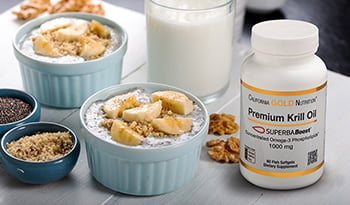Why a Dietician Prioritizes Time Outside and Omega-3 Fats Daily
OŚWIADCZENIENiniejszy blog nie ma na celu diagnozowania...
- W tym artykule:
- Prioritize Time in Nature
- Load Up on Omega-3s
- Design Your Ideal Routine

There is no one perfect way to approach wellness. Trying to figure out where to start in putting together your own wellness routine can feel overwhelming. Countless components contribute to mental and physical wellness, so it is essential to assess your own lifestyle and goals when designing the best wellness routine for yourself.
Over the years, my wellness routine has ebbed and flowed based on where I’m at in my life and which areas of wellness need attention at that time. While good sleep habits and eating plenty of prebiotics to promote digestive health and a healthy microbiome are long-term habits that I consistently incorporate as part of my overall daily wellness, I am currently focusing on time outside and getting enough omega-3 fats. Here’s why.
Prioritize Time in Nature
I’ve always loved being outside—but it is even more enjoyable now that I can share it with my son. The fresh air, sun, and earthy smells perk me right up, and the movement I get walking, running, and playing energizes me, even during those mid-day lulls.
Science confirms spending time outside benefits your health and mood. Here are some of the research-backed benefits of time spent alfresco:
Vitamin D Production
Foods such as eggs, milk, mushrooms, and fortified cereal contain this essential nutrient, but the best source is the sun. When your skin is exposed to UV rays, your body produces vitamin D. Many of us are deficient in vitamin D because of inadequate time spent outside or because we live in a northern climate where the sun is too low in the sky to produce this vitamin in our skin.
You may be most familiar with its role in bone health, but vitamin D is also important for your immune system and heart health.
I aim for at least 30 minutes spent outside each day, but the colder months make that more challenging. Even when I do get out in the sun during the winter months, many layers of clothing block my skin from being able to produce vitamin D. If you live in a northern state where time outside is more limited for several months of the year, consider a vitamin D supplement to ensure you are meeting your needs.
Mood Boost
Research suggests that time spent outdoors benefits your mental health, especially for those who exercise outside. Of course, exercise on its own helps you relax and cheers you up.
Remember, outdoor exercise doesn’t have to be long and intense to be beneficial. Even a casual walk with your pup, swimming laps in the pool, or doing some outdoor yoga are wonderful ways to combine outside time with exercise.
If those activities aren’t up your alley, remember that any time spent outside, even if you aren’t intentionally exercising, may be beneficial. Helping your little one at the playground, doing yard work, or putting up your holiday decorations all count as quality time spent outside.
Improved Concentration
Studies show that children with ADHD score better on tests of concentration after a walk in the park compared to walking through a downtown area. Although these studies were conducted with children, adults seem to benefit from improved concentration after time spent outdoors as well. Not everyone lives near a grassy park or wooded trails, but even a walk around your block can help improve your focus after staring at your computer screen for hours.
When spending time outside, whether in a hot, humid climate or on a comfortable fall day, I always bring a refillable water bottle with me. Staying hydrated helps improve my mood and my focus, and one of the best ways I have found to keep up with my water intake is to always keep a bottle of water close by.
I prefer refillable bottles because they are better for the environment and the insulated options keep my water nice and cold. Plus, many bottles come in cute patterns and colors, and the loops on the lid make them easy to tote around.
During the summer months when I sweat more, I also add electrolytes to my water. These nutrients keep you hydrated by helping your cells store water, and they aid muscle contractions too.
Load Up on Omega-3s
Along with spending time outside, I have also started taking an algal oil supplement to provide the long-chain omega-3 fatty acids EPA and DHA as these forms offer so many health benefits. They are especially important during pregnancy and early life, as research suggests they promote brain health. Omega-3s may also improve risk factors of heart disease, help reduce inflammation, and support mental health.
Luckily, omega-3s can be found in several common foods, like tuna, salmon, chia, hemp, flax seeds, and walnuts. While I aim to include as many of these foods as possible in my diet, some days I get more than others. To ensure I am consistently meeting my needs, I incorporate an omega-3 supplement into my daily wellness routine.
Support Mental Health
Omega-3 fatty acids may also support mental health and help improve depressive symptoms. While most studies examining the effects of omega-3s on depression have been conducted on individuals already taking prescription medication for their diagnosis, studies suggest EPA-rich omega-3 products offer benefits as an “add-on” therapy.
Some research also indicates omega-3s may help improve symptoms of postpartum depression, bipolar disorder, and obsessive-compulsive disorder. While the research in these areas is promising, more studies are needed to fully understand how omega-3s support mental health and appropriate dosages.
Other Potential Benefits
In addition to their mental health benefits, omega-3 fatty acids are an essential component of cell membranes and are involved in the regulation of blood flow, the contraction and relaxation of artery walls, and inflammation.
And if our goal in taking an omega-3 supplement is to reduce inflammation, you might consider taking curcumin from turmeric and resveratrol as well—both may help improve inflammation. Also, some evidence indicates controlling blood sugar levels by reducing the intake of food and beverages loaded with added sugars may lead to improvements in inflammation as well.
The potential benefits of omega-3 fatty acids are broad-reaching and there are few if any, downsides to loading up on omega-3-rich foods or taking a supplement to ensure you are meeting your needs. Before adding any new supplement to your regimen, consult your knowledgeable healthcare provider to verify the appropriate dose for you.
Design Your Ideal Routine
I prioritize spending time outside and getting enough omega-3s in my daily wellness routine, but there are many other areas I aim to stay mindful of as well. I’ve learned that I feel best with adequate sleep (which, for me, means at least 8 hours), eating lean protein at every meal, and loading up on fruits and vegetables throughout the day.
While this list is not exhaustive, it works for me—and I believe some of these habits may benefit you as well. If you are considering improving your wellness routine, consult your healthcare provider to help identify areas that could use the most improvement and do some self-reflection to analyze your individual habits and goals.
As always, consult with professionals who can help guide you along the way. Registered dietitians, certified personal trainers, and mental health professionals are all your allies who can help you design and implement your ideal daily wellness routine so you can feel your best.
It can take a while to optimize your routine to find what works best for you – but the results and peace of mind are worth it!
References:
- https://www.health.harvard.edu/mind-and-mood/a-prescription-for-better-health-go-alfresco
- https://pubmed.ncbi.nlm.nih.gov/12509593/
- https://www.ncbi.nlm.nih.gov/pmc/articles/PMC3712371/
- https://pubmed.ncbi.nlm.nih.gov/21784145/
- https://www.ncbi.nlm.nih.gov/pmc/articles/PMC3976923/
- Nevins JEH, Donovan SM, Snetselaar L, et al. Omega-3 Fatty Acid Dietary Supplements Consumed During Pregnancy and Lactation and Child Neurodevelopment: A Systematic Review. J Nutr. 2021;151(11):3483-3494.
- Wolters M, von der Haar A, Baalmann AK, Wellbrock M, Heise TL, Rach S. Effects of n-3 Polyunsaturated Fatty Acid Supplementation in the Prevention and Treatment of Depressive Disorders-A Systematic Review and Meta-Analysis. Nutrients. 2021;13(4):1070.
- Liao Y, Xie B, Zhang H, et al. Efficacy of omega-3 PUFAs in depression: A meta-analysis. Transl Psychiatry. 2019;9(1):190.
- Guu TW, Mischoulon D, Sarris J, et al. International Society for Nutritional Psychiatry Research Practice Guidelines for Omega-3 Fatty Acids in the Treatment of Major Depressive Disorder. Psychother Psychosom. 2019;88(5):263-273.

 Wg Dr. Ellen Albertson, PhD, RDN, NBC-HWC
Wg Dr. Ellen Albertson, PhD, RDN, NBC-HWC


